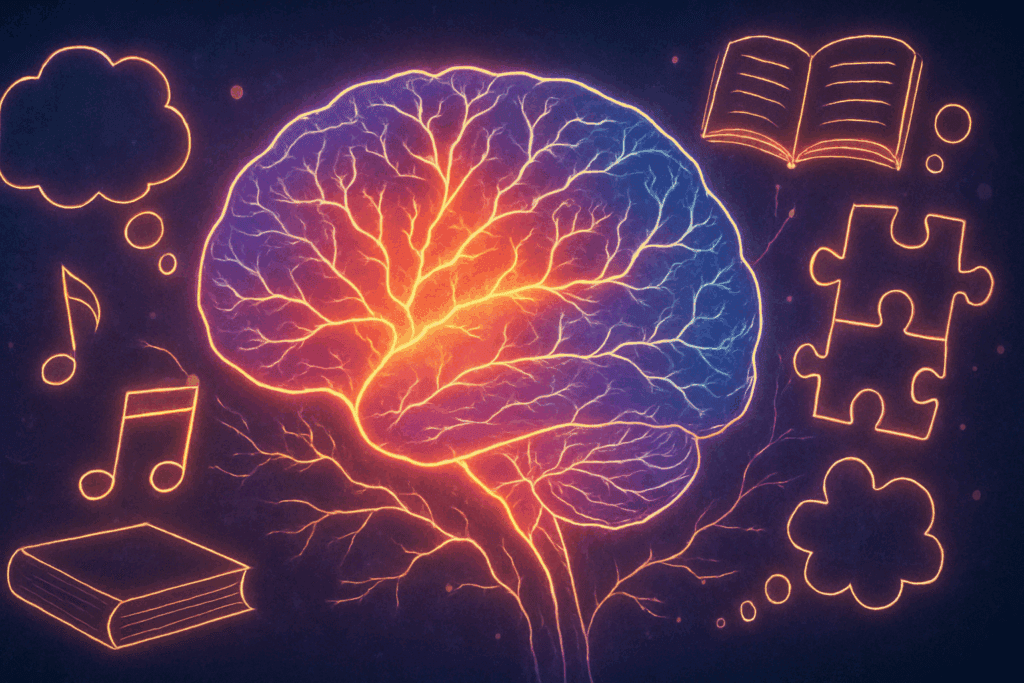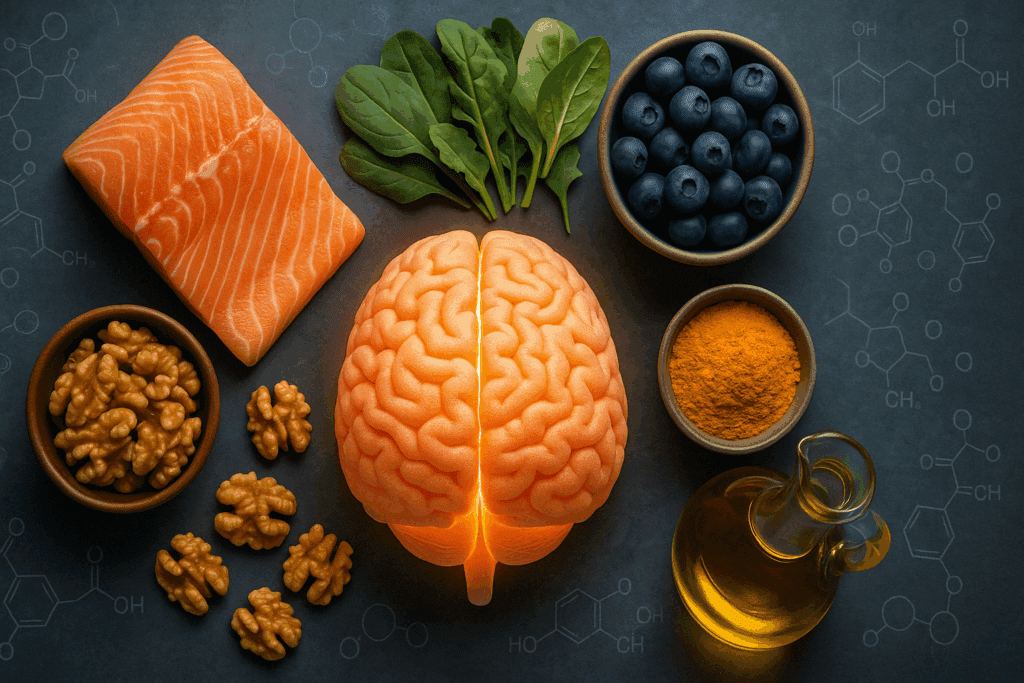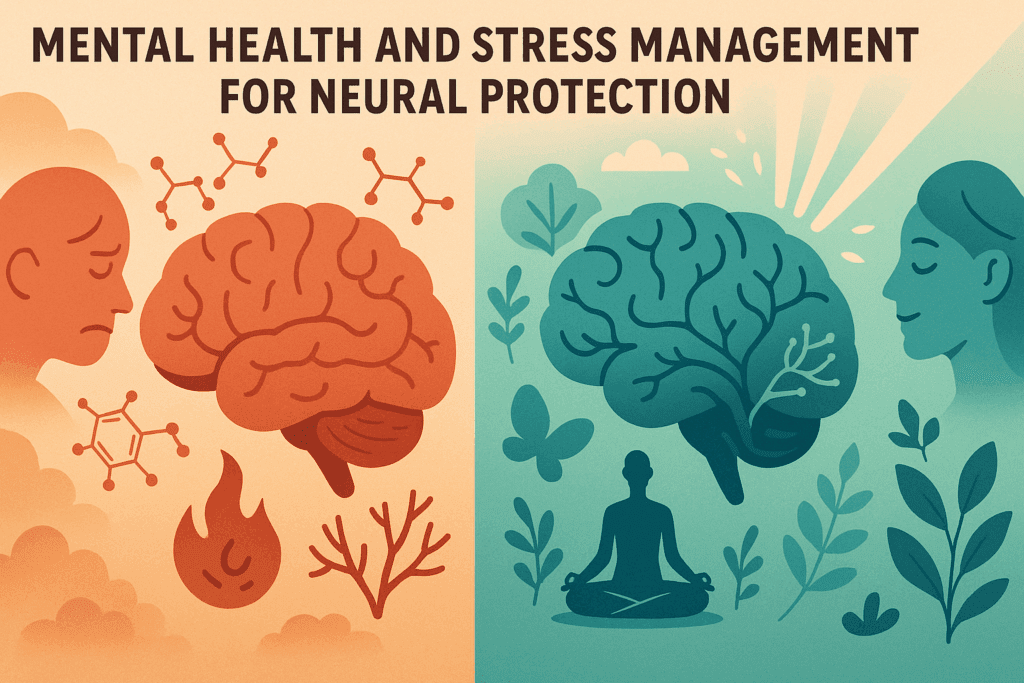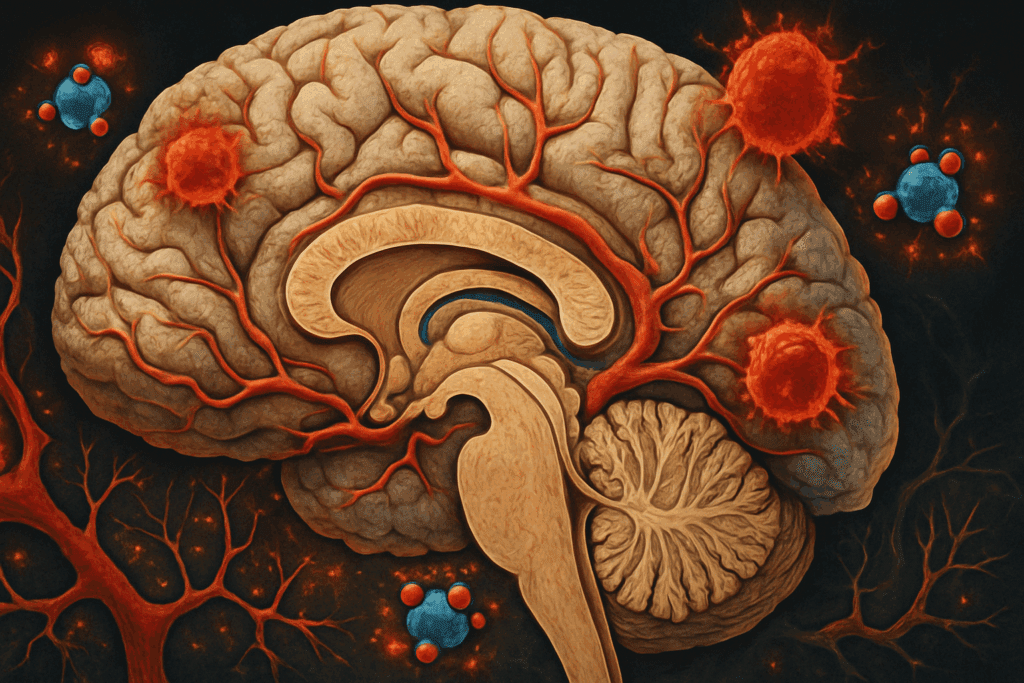Introduction: The Urgency of Brain Protection in a Cognitive Era
In the modern world, our brains are constantly under siege—whether from environmental toxins, chronic stress, poor nutrition, or even digital overload. As cognitive demands rise in both professional and personal spheres, protecting your brain from damage is no longer a matter of luxury or age—it’s a necessity. From the earliest stages of development to late adulthood, the integrity of our neural systems shapes everything from emotional regulation and memory retention to executive function and decision-making. Understanding how to protect your brain from damage is therefore not only a cornerstone of personal health but a prerequisite for long-term success and quality of life.
You may also like: How to Choose the Best Brain Supplements for Adults: Science-Backed Ingredients That Support Focus, Memory, and Mental Clarity
While the idea of “brain health” may seem abstract, it is grounded in a growing body of evidence that connects lifestyle, dietary choices, and mental engagement with measurable improvements in neural resilience. Importantly, strategies to safeguard the brain must go beyond reactive measures like symptom treatment and instead focus on proactive, science-backed methods of cognitive enhancement. These interventions can help build a robust foundation that resists decline and dysfunction, including conditions like dementia. By the end of this exploration, you will not only gain insight into the mechanisms behind brain degradation but also discover actionable, research-supported practices that support both immediate focus and lifelong mental clarity.

The Biological Foundations of Brain Health
Brain health is deeply intertwined with the physiological systems that nourish, protect, and regulate neuronal activity. At the cellular level, the brain depends on a delicate balance of neurotransmitters, blood flow, and oxygenation to maintain optimal performance. Neurons, the building blocks of cognitive processing, require a constant supply of glucose and essential nutrients to function efficiently. Any disruption to this supply chain—be it from inflammation, oxidative stress, or compromised vascular function—can impair memory, focus, and decision-making.
One of the key mechanisms in brain deterioration is neuroinflammation, which has been increasingly implicated in a range of cognitive disorders including Alzheimer’s disease and vascular dementia. Chronic inflammation acts as a silent disruptor, damaging neural pathways and accelerating brain aging. This is why anti-inflammatory lifestyle strategies, such as dietary adjustments and stress reduction, are critical components of a comprehensive brain health plan.
Moreover, the brain is uniquely vulnerable to oxidative stress due to its high oxygen consumption and lipid-rich environment. Free radicals, if not neutralized by antioxidants, can degrade cell membranes and impair synaptic function. The long-term consequence of unchecked oxidative stress is not just accelerated aging but increased susceptibility to neurodegenerative diseases. These insights underscore the need for proactive interventions that support not only cognitive function but also structural brain integrity.

Cognitive Enhancement Through Neuroplasticity
Neuroplasticity, the brain’s remarkable ability to adapt and reorganize itself, provides a compelling argument for lifelong cognitive training. Contrary to the outdated belief that brain development ceases in early adulthood, we now know that neural circuits can be rewired in response to new experiences, learning, and challenges throughout life. This adaptive capacity is not just a curiosity of neuroscience but a powerful tool for protecting brain health and enhancing performance.
Engaging in activities that stimulate the brain—such as learning a new language, practicing a musical instrument, or solving complex puzzles—can strengthen synaptic connections and foster the growth of new neurons through a process called neurogenesis. In particular, the hippocampus, a region central to memory and learning, is highly responsive to mental stimulation. Studies have shown that individuals who engage in cognitively demanding tasks on a regular basis tend to have greater hippocampal volume and slower cognitive decline.
The benefits of neuroplasticity extend beyond memory and learning to encompass improved focus, emotional regulation, and decision-making. By consistently challenging the brain, we not only preserve existing cognitive function but also build new reserves that can buffer against age-related decline or neurological injury. Thus, incorporating intellectual novelty into daily routines is more than a hobby—it’s an investment in long-term brain health and cognitive resilience.
Nutrition as a Pillar of Brain Defense
What we eat profoundly influences our ability to think, remember, and maintain mental clarity. The emerging field of nutritional neuroscience has revealed that diet plays a central role in regulating neurotransmitter levels, reducing inflammation, and protecting against oxidative stress—all of which contribute to overall brain health. This is particularly relevant in the context of brain health and dementia, as numerous studies have linked dietary patterns with the risk of cognitive decline.
One of the most promising dietary models for cognitive protection is the Mediterranean diet, which emphasizes whole grains, vegetables, legumes, fruits, fish, and healthy fats such as olive oil and nuts. These foods are rich in antioxidants, polyphenols, omega-3 fatty acids, and B vitamins, all of which have been shown to support cognitive function and reduce neuroinflammation. Omega-3s, in particular, are critical for maintaining the fluidity of neuronal membranes and modulating inflammatory pathways in the brain.
It’s also essential to avoid foods that may contribute to cognitive dysfunction. Diets high in processed sugars, refined carbohydrates, and trans fats have been associated with insulin resistance in the brain—a condition sometimes referred to as “type 3 diabetes” due to its link with Alzheimer’s disease. Therefore, protecting your brain from damage involves not only including neuroprotective nutrients but also minimizing exposure to dietary elements that promote metabolic stress and inflammation.

Exercise and the Brain: Physical Activity for Mental Clarity
Physical exercise is one of the most effective, accessible, and scientifically validated ways to enhance brain health. Far from being merely a tool for cardiovascular or muscular fitness, regular physical activity profoundly influences cognitive performance and emotional stability. It does so by stimulating the release of brain-derived neurotrophic factor (BDNF), a protein that promotes the survival and growth of neurons.
Aerobic exercise in particular—such as brisk walking, cycling, or swimming—has been shown to increase hippocampal volume, improve executive function, and enhance mood. This makes it a valuable tool not only for preventing neurodegenerative diseases but also for improving daily focus and decision-making. In fact, people who engage in consistent aerobic activity tend to show better performance on tasks requiring sustained attention, working memory, and cognitive flexibility.
The relationship between physical activity and brain health also extends to metabolic regulation. Exercise improves insulin sensitivity, reduces systemic inflammation, and enhances sleep quality—all of which contribute to a healthier brain environment. These effects are especially relevant for individuals at risk for dementia, as they target many of the physiological pathways involved in cognitive decline. Thus, integrating physical activity into your lifestyle is not merely about fitness—it’s about building a stronger, more resilient brain.
The Role of Sleep in Cognitive Longevity
Sleep is often underappreciated in discussions of cognitive enhancement, yet it is one of the most critical processes for maintaining brain health. During sleep, particularly deep non-REM stages, the brain undergoes essential processes such as memory consolidation, synaptic pruning, and the clearance of metabolic waste through the glymphatic system. Disrupted or insufficient sleep can interfere with these processes, leading to cognitive fog, emotional instability, and long-term neural damage.
Chronic sleep deprivation has been linked to increased levels of amyloid-beta plaques, a hallmark of Alzheimer’s pathology. This highlights a critical connection between poor sleep and the progression of brain health and dementia. On the flip side, high-quality sleep enhances neuroplasticity and supports the integration of new information, making it indispensable for anyone seeking to optimize cognitive performance.
Improving sleep hygiene—such as maintaining a consistent sleep schedule, minimizing exposure to blue light before bedtime, and creating a restful sleep environment—can have profound effects on brain function. For those struggling with insomnia or disrupted sleep patterns, addressing underlying causes like stress, screen overuse, or diet can restore the restorative power of sleep and protect against cognitive erosion over time.

Mental Health and Stress Management for Neural Protection
Mental health is not just an emotional concern—it is a foundational element of cognitive well-being. Chronic stress, anxiety, and depression can damage the brain by elevating cortisol levels, which in turn impairs memory and shrinks the hippocampus. Over time, unrelieved psychological stress can alter brain structure and function, reducing the ability to concentrate, regulate emotions, and make sound decisions.
The good news is that stress management strategies can significantly buffer against these effects. Practices such as mindfulness meditation, cognitive behavioral therapy (CBT), and breathwork have been shown to reduce cortisol levels and restore equilibrium to the nervous system. Regular meditation, for instance, not only calms the mind but also increases gray matter density in areas associated with attention and emotional regulation.
Taking mental health seriously is an essential component of protecting your brain from damage. It involves not only treating disorders when they arise but also cultivating daily practices that foster emotional resilience and cognitive clarity. Whether through professional support or personal strategies, prioritizing mental well-being strengthens your brain’s ability to adapt, grow, and thrive in the face of life’s challenges.
Avoiding Neurotoxins and Environmental Hazards
Our modern environment is filled with substances that can compromise brain health. From heavy metals like lead and mercury to pesticides and air pollutants, exposure to these neurotoxins has been associated with cognitive impairments and an increased risk of neurodegenerative diseases. Minimizing exposure is thus a practical and essential aspect of long-term brain protection.
Household items such as non-stick cookware, synthetic fragrances, and certain cleaning products can contain chemicals that disrupt endocrine and neurological function. Even seemingly innocuous habits like drinking from plastic bottles or microwaving food in plastic containers can introduce harmful compounds into the body. Making conscious choices about what we ingest and surround ourselves with can significantly reduce our toxic burden.
It’s also worth noting that certain professions and hobbies carry higher risks of neurotoxic exposure—industrial workers, for example, may come into contact with solvents or fumes that accumulate in the nervous system. Taking proactive steps such as using protective gear, enhancing ventilation, or switching to less toxic alternatives can go a long way in reducing environmental risks and supporting overall brain health.
Social Connectivity and Its Impact on Brain Resilience
Human beings are inherently social creatures, and our brains are wired to thrive in the context of meaningful relationships. Social interaction stimulates neural networks involved in empathy, communication, and emotional regulation, all of which are critical for healthy cognitive function. In fact, strong social ties have been associated with a reduced risk of dementia and longer lifespan, underscoring the importance of connection for brain health.
Loneliness and social isolation, on the other hand, have been linked to increased levels of stress hormones, decreased cognitive reserve, and even structural brain changes. In an age where digital communication often replaces face-to-face interaction, it’s more important than ever to foster genuine connections. Whether through community involvement, regular family interactions, or friendships, nurturing your social life can have profound effects on your cognitive well-being.
Moreover, engaging in group activities—such as team sports, book clubs, or volunteer work—offers dual benefits: intellectual stimulation and emotional fulfillment. These interactions provide the brain with diverse stimuli and reinforce neural pathways that support memory, attention, and executive function. In this way, social engagement becomes not just a quality-of-life enhancer but a vital strategy for protecting your brain from damage.
Standalone FAQ: Brain Health, Cognitive Protection, and Dementia Prevention
1. Can lifestyle changes in midlife significantly reduce the risk of dementia later on?
Yes, midlife is a critical window for protecting long-term brain health. Research shows that many risk factors for dementia—like hypertension, obesity, chronic stress, and inactivity—begin to accumulate during our 40s and 50s. Making proactive lifestyle changes during this period, such as improving cardiovascular health, reducing processed sugar intake, and increasing cognitive engagement, can offer profound protective effects. For instance, regular aerobic exercise and Mediterranean-style diets rich in polyphenols have been associated with lower amyloid plaque buildup and reduced inflammation, both of which are linked to dementia. Prioritizing brain health and dementia prevention strategies earlier in life yields the most impactful results, acting as a form of “cognitive savings account” for the future.
2. How does chronic sleep deprivation affect brain health over time?
While the immediate consequences of poor sleep include irritability and poor focus, the long-term neurological effects are more serious. Chronic sleep deprivation disrupts glymphatic clearance—a brain-specific system that flushes out neurotoxins like beta-amyloid during deep sleep. Without consistent, restorative rest, these waste products can accumulate, increasing the risk of neurodegenerative diseases. Furthermore, poor sleep alters the structure of the hippocampus, a key region for memory consolidation. Protecting your brain from damage isn’t just about what you do when you’re awake—it starts with high-quality sleep hygiene and respecting the body’s natural circadian rhythm.
3. Are there any overlooked social factors that influence brain health?
Absolutely. Social isolation and lack of meaningful relationships are among the most underrated threats to brain health and dementia prevention. Studies have shown that loneliness increases cortisol levels and systemic inflammation—both of which are linked to cognitive decline. Engaging in regular, emotionally enriching social interaction can strengthen neural networks involved in language, empathy, and executive function. Community involvement, mentorship, or even structured group hobbies like book clubs or choir singing can offer protective effects equivalent to more commonly discussed factors like diet or exercise. Human connection, it turns out, may be one of the most powerful ways to protect your brain from damage.
4. What role does gut health play in supporting long-term brain function?
The gut-brain axis is a rapidly expanding area of research, revealing that gut microbiota can directly influence mood, cognition, and neuroinflammation. Short-chain fatty acids like butyrate, produced by beneficial bacteria, are known to strengthen the blood-brain barrier and reduce microglial activation—key processes in maintaining brain health. Conversely, dysbiosis (an imbalance of gut flora) can trigger systemic inflammation and has been associated with conditions like depression, anxiety, and even Alzheimer’s. Supporting gut health through fermented foods, fiber-rich diets, and possibly targeted probiotics is an emerging strategy in the broader discussion of how to protect your brain from damage.

5. Can creative activities like painting or playing music actually improve cognitive resilience?
Yes—engaging in creative expression has unique cognitive benefits beyond passive activities like watching TV or reading. Art and music stimulate multiple brain regions simultaneously, including those responsible for emotional regulation, spatial awareness, and memory recall. Moreover, these activities often require sustained focus, problem-solving, and fine motor skills—all of which build cognitive reserve, an essential buffer against age-related decline. Practicing a new instrument or learning to paint may help form new synaptic connections, supporting lifelong brain health. Creative hobbies aren’t just emotionally rewarding—they’re a scientifically supported way to protect your brain from damage.
6. How do environmental toxins influence long-term brain health and dementia risk?
Chronic exposure to pollutants like heavy metals, pesticides, and air pollution has been linked to increased oxidative stress and neuroinflammation—both precursors to neurodegenerative disorders. For example, fine particulate matter (PM2.5) in polluted air has been associated with accelerated brain aging and even structural changes in white matter. Avoiding or mitigating exposure—through air filtration systems, choosing organic produce, and reducing plastic use—can be a proactive step in brain health and dementia prevention. While genetics play a role, environmental factors are modifiable, giving individuals greater control over how to protect their brain from damage.
7. What surprising role does financial literacy play in brain health?
Financial decision-making engages complex cognitive processes including working memory, planning, and executive function. Maintaining or improving financial literacy in later life has been shown to correlate with stronger performance on cognitive assessments, possibly due to its mentally stimulating nature. Additionally, stress related to financial instability is a known contributor to hippocampal shrinkage and reduced cognitive flexibility. Teaching older adults how to manage their finances through digital tools or workshops can indirectly serve as a form of cognitive training. Supporting brain health isn’t limited to diet or supplements—daily tasks that require planning and analysis also help build resilience.
8. Is there a connection between hearing loss and dementia risk?
Yes, age-related hearing loss is now recognized as a major modifiable risk factor for dementia. When the brain receives less auditory input, it may redirect cognitive resources from memory and executive function to compensate, ultimately straining mental processing. This sensory deprivation can also lead to social withdrawal, increasing isolation and reducing cognitive engagement. Using hearing aids or undergoing regular audiometric evaluations can help mitigate this risk and support overall brain health. It’s a compelling example of how protecting your brain from damage sometimes involves addressing parts of the body we wouldn’t immediately associate with cognition.
9. How can mindfulness and meditation practices influence the physical structure of the brain?
Mindfulness-based practices have been shown through neuroimaging to increase cortical thickness in regions linked to attention, emotional regulation, and self-awareness. Regular meditation reduces activity in the default mode network—a brain system associated with rumination and mind-wandering, both of which are exacerbated in anxiety and depression. Furthermore, these practices can lower cortisol and inflammatory markers, both of which play a role in neurodegenerative pathways. Integrating mindfulness into a daily routine supports brain health by strengthening the brain’s ability to recover from stress and enhancing neuroplasticity. It’s not just mental wellness—meditation is a physiological investment in how to protect your brain from damage.
10. What is cognitive reserve, and how can we build more of it over time?
Cognitive reserve refers to the brain’s ability to improvise and find alternate ways of completing tasks when faced with decline or damage. It’s shaped by lifelong learning, occupational complexity, and varied intellectual engagement. Unlike IQ, cognitive reserve can be expanded well into old age through activities like bilingualism, travel, teaching, or mastering new skills. Building cognitive reserve doesn’t just delay the onset of dementia symptoms—it helps individuals maintain independence even in the presence of brain pathology. This concept reinforces that brain health and dementia risk aren’t just determined by genetics—they’re shaped by the daily choices we make across a lifetime.

Conclusion: Building a Lifetime Blueprint for Brain Health and Cognitive Longevity
Protecting your brain from damage is not a singular act but an ongoing, multidimensional commitment. By integrating scientifically supported strategies into your daily life—from nutrition and exercise to stress reduction and cognitive engagement—you can lay the foundation for sustained mental clarity and resilience. These interventions not only safeguard you from the threats of cognitive decline and dementia but also empower you to make better decisions, stay focused under pressure, and enjoy a higher quality of life.
The concept of brain health must be approached holistically, recognizing the complex interplay between physical, emotional, and environmental influences. Whether you are looking to enhance your current performance or future-proof your mind against age-related decline, adopting a comprehensive, evidence-based plan can make a profound difference. The growing body of neuroscience affirms that even small, consistent changes can yield significant long-term benefits.
In an era where cognitive demands continue to escalate and neurodegenerative conditions are on the rise, prioritizing brain health is more than wise—it is essential. Let this be a call to action: invest in your brain the same way you would in your physical fitness or financial stability. With the right tools and understanding, you can protect your brain from damage, sharpen your cognitive edge, and extend your mental vitality well into the future.
Was this article helpful? Don’t let it stop with you. Share it right now with someone who needs to see it—whether it’s a friend, a colleague, or your whole network. And if staying ahead on this topic matters to you, subscribe to this publication for the most up-to-date information. You’ll get the latest insights delivered straight to you—no searching, no missing out.
Further Reading:
Cognitive Health and Older Adults


